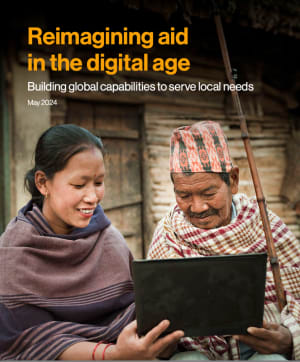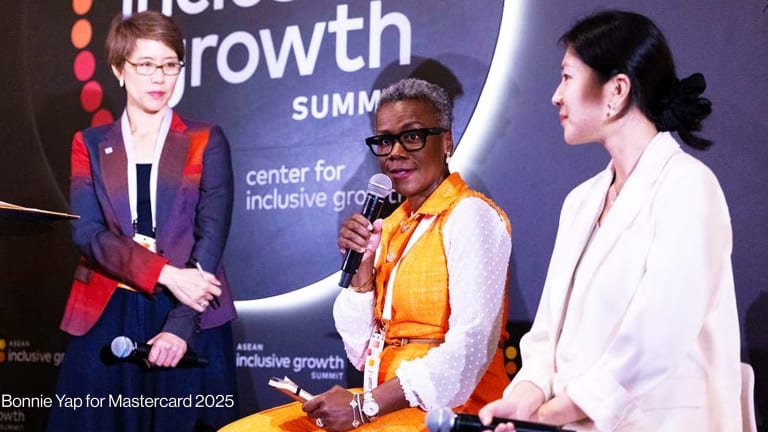
As global crises become more frequent and complex, connecting those in need with the right kind of aid at the right time requires greater collaboration between many players across the aid ecosystem. This means creating stronger networks between governments, multilaterals, NGOs, and recipients, as well as the financial services and aidtech providers that support humanitarian and development, or H&D, aid flows.
With a résumé that ranges from serving development organizations like the World Bank and the Global Fund to Fight AIDS, Tuberculosis and Malaria, to financial service providers such as Barclays — now Absa Group Limited — and Onafriq, Aisling Quirke joined Visa earlier this year to help make this happen. After following the evolution of the H&D sector from the front line for two decades, Quirke is now responsible for leading commercial partnerships in her new role as Visa’s global director of humanitarian and development partnerships.
She sat down with Devex to discuss why choice, inclusion, and innovation are key to transforming the delivery of H&D assistance, and how making aid payments as seamless as consumer payments can enable aid organizations to increase their impact.
This conversation has been edited for length and clarity.
What triggered your interest in development?
In the 90s I saw my own country, Ireland, evolve quickly from being the “poor man of Europe” to a wealthy nation. I was keen to understand what had driven that growth and help support a similar transformation in other countries.
In Ireland’s case, that growth was catalyzed by a combination of aid, innovation, and foreign direct investment. That massively influenced my perspective and helped me understand the role external funding and the private sector can play.

Which development issues are you most passionate about?
Health is close to my heart, and I think there is a real opportunity to reposition how the H&D sector thinks about it. To me, health care should be seen as an area of investment and a driver of growth, as opposed to a cost. I believe technology and payments have a real role to play in this.
More broadly, I’m interested in entrepreneurship and private-sector development. In a world facing many complex challenges, we need innovative solutions. I firmly believe entrepreneurs can drive this.
The good news is countries that receive aid typically have a thriving ecosystem of small businesses. The challenge is they often lack enabling infrastructure, or the funding to scale. I’m interested in how Visa and its partners can support them, and thereby transition to more sustainable, country-driven development.
For much of your career you’ve worked at the intersection between development and business. Why are you drawn to that territory?
Development is about people, and businesses do a great job of understanding human behavior and designing solutions that meet their needs. As the H&D sector works to move away from prescriptive aid, the private sector can help shape impactful solutions.
Take Mo Ibrahim, founder of Celtel, for example. In the 1990s, there were very few fixed telephone lines in Africa. Of course, that hurt economic growth in the region, health care, security — you name it. Not only did Mo build a successful business fixing that problem, but he solved or helped to solve a huge range of development challenges in the process.
If we look at some of today’s most pressing development challenges, we can apply the same logic. For example, making universal health care coverage (UHC) a reality will require digital health records, so that health care workers can provide the right treatment at the right time. But digital health records require data centers, network infrastructure, mobile devices and more — all provided by the private sector.
What are the biggest challenges facing the H&D sector today and what opportunities do they create?
Climate change and conflict are amplifying the need for H&D assistance, but funding is getting tighter. Many countries that send aid and development funds are facing pressure to limit support for external causes. Some of the countries receiving overseas development assistance desire more say in how that aid is used.
These factors are forcing the H&D sector to do much more with less, and to rethink how aid is raised and what kinds of projects it supports.
How can Visa help solve these challenges?
In a nutshell, Visa moves money quickly, efficiently and transparently. And we work with a network of partners — including banks, fintechs, aidtechs, and more — to do that.
So, if you’re an aid organization looking to get funds to an active conflict zone quickly, Visa and its partners might be able to help. If you’re a global development agency that needs greater transparency over where your investment is going, Visa and its partners might be able to help.
At a meta-level, what this means is we can help the H&D sector get more of its money to where it needs to be.
And where there’s a gap or unmet need, we’re also putting funding and expertise towards designing new solutions, or enhancing existing ones. In my first 90 days in this role, it has been exciting to see the level of investment Visa is making here.
For example, many of the nearly 3 million Venezuelan migrants in Colombia lack access to financial services, often because know-your-customer, or KYC, hurdles prevent them from opening bank accounts. Inclusion starts with understanding a need and then leveraging human-centered design to meet it. So, Visa’s Innovation Lab for Latin America is now co-designing migrant-friendly solutions to tackle this challenge.
Visa recently produced a report with Devex about humanitarian aid delivery and digital payments. Which findings did you find most meaningful and what opportunities do they present for the development community and its partners?
A key finding is that development and humanitarian organizations want more choice and partnership as they try to solve for complex payments needs. They don’t want to feel bound to always using one or two options.

Building global capabilities to serve local needs can result in more flexible, inclusive, and sustainable humanitarian aid interventions. A new Devex report produced in partnership with Visa offers recommendations.
Read the full report here.
That’s where Visa can help. We want to ensure development and humanitarian organizations have the right choice of payment providers and solutions so they can move quickly in rapidly changing contexts.
The report also revealed that 62% of practitioners polled believe that collaboration among financial service providers is insufficient. Coming from a banking background, this resonates with me — and it’s something that needs to change. There is a clear need for different parts of the ecosystem to work together. That’s easier when each party understands their strengths and what they bring to the table, and I think a third party like Visa can help them unlock that.
What are your aspirations for your new role five years from now?
We want to ramp up our work with the sector through more intentional engagement. We will continue to provide support from a payments perspective through our banking partners, but also work more closely with digital partners that can add value and solve some of the challenges we see.
I would love Visa to be known in the H&D sector not just as a payments company but for its ability to harness our network of solution providers to uplift everyone, everywhere — and for us to show that where you live doesn’t need to determine if you live, or how you live.
What would you like readers, some of whom may have no idea Visa works in this space, to take away from this interview?
That Visa is actively engaged with and attentive to practitioners in the H&D sector. We're eager to collaborate and listen because we believe our expertise and technology can help achieve significant, positive outcomes for those in need.
So, if you're attending the Africa Health Tech Summit in Kigali, let’s grab a coffee! I’d love to connect and chat, even if it’s just to provide a sounding board for your ideas.








